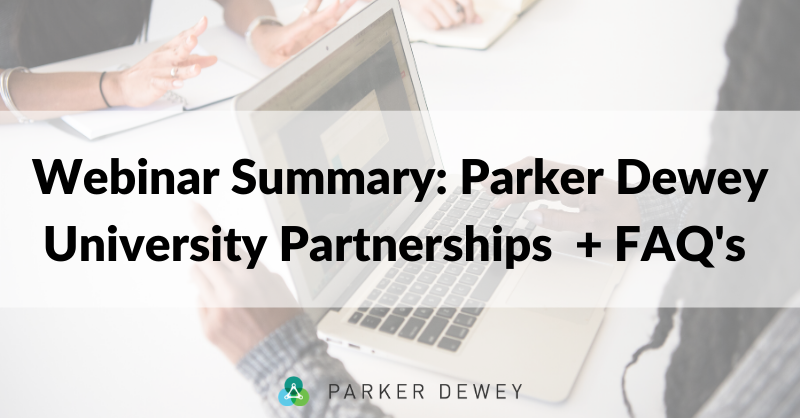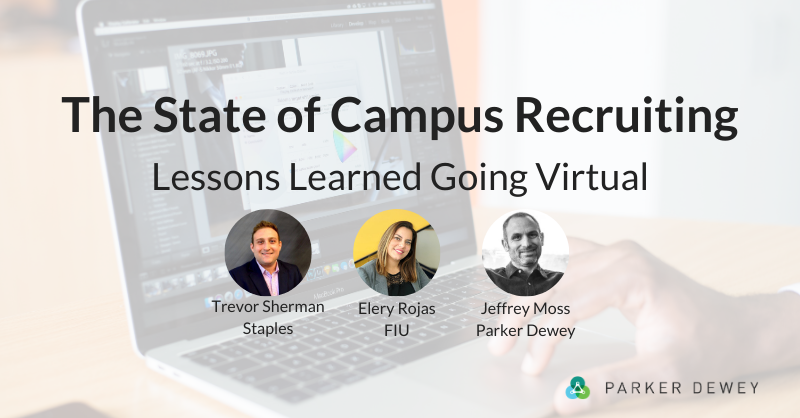.png)
COVID-19’s Impact on University Recruiting
The rising prevalence of the COVID-19 virus has affected virtually every aspect of the economy including higher education and university recruiting. As companies and universities look for ways to address this dynamic situation, a webinar was hosted on Tuesday, March 17, 2020 to share some strategies for organizations to make meaningful connections with students by offering project-based remote work. Watch the replay now!
The session was co-facilitated by Lori Sparger, COO+CIO for Purdue’s College of Liberal Arts, and Jeffrey Moss, Founder and CEO of Parker Dewey. Parker Dewey is a mission-driven organization focusing on bridging the gap between college and career, and pioneered the concept of Micro-Internships to do so. Purdue’s College of Liberal Arts was one of the company’s earliest university partners and has found Micro-Internships to be highly beneficial for helping its students explore careers and gain professional experience while driving engagement with employers and alumni.
The webinar focused on how remote-based project work can help in two areas. The first is by helping employers who have not completed their recruitment cycle to:
- Engage students effectively without having to go on-site. With most career events canceled and travel limited for the foreseeable future, remote projects allow employers to interact with students from institutions across the country including those not in target schools or fields.
- Interview “on steroids.” Employers can evaluate multiple candidates through a succinct process and gauge work quality as students complete value-added projects on behalf of hiring managers. Furthermore, through these authentic engagements, companies can better assess core skills such as grit, communication, and analytical thinking that are often hard to evaluate from a transcript or interviews.
- By engaging with real work experiences, employers and students alike can mutually assess a student’s fit with the organization.
The second use case is as a contingency plan should summer internship programs be canceled or refined. In this case, remote, project-based work can help:
- Develop comfort in a remote environment, preparing expected interns and existing employees opportunities to engage in discrete projects before the summer. By
- Create opportunities for those students who are not able to participate in onsite internships due to office closure or travel restrictions. Internships can be “unbundled” into multiple projects with set deadlines and various managers providing oversight.
- Provide “insurance” should certain students be unable to start an internship program, helping companies to identify and engage prospective candidates.
- Support current managers with additional help in case of increased business demand and workload.
Remote, project-based work offers an opportunity to help both employers and students during this unprecedented time. Benefits for employers include the opportunity to cultivate their talent pipeline, evaluate the work of students and assess their fit to the organization. Plus, it is a flexible staffing solution that can be expanded or contracted as business needs evolve.
For students, benefits abound including an opportunity to gain professional experience and explore careers from wherever they are located. They, too, can assess their fit with the organization to determine their interest in longer-term opportunities with the organization. Also, students are paid for their work which, while always beneficial, can be particularly helpful for those who may have depended on or off-campus jobs, work study, or other employment which may no longer be available.
These are unprecedented times, and pulling together to creatively address a growing need can benefit both students and organizations. Employers and universities alike are encouraged to collaborate in developing and promoting remote, project-based opportunities for students. Employers can get started by clicking here to learn more and post these opportunities. Universities can download free toolkits full of marketing materials to engage students, employers, and alumni/friends in spreading the word about these opportunities.
Here are some additional resources that may be helpful:
- An overview of how remote projects can help you respond to COVID-19
- Remote project ideas from various business areas with suggested compensation
- News articles about remote, project-based opportunities (also called Micro-Internships)
- Links to the webinar recording and slides (which includes additional case studies and examples)
- For questions about the legal implications of Micro-Internships, click here to view our FAQ’s. You can also review the terms of use for Career Launchers (students and recent grads) and Companies
- Still have questions?
- If you are a company and have more questions about Micro-Internships, please let us know.
- If you are a college/university and are interested in a free university partnership with Parker Dewey, please let us know.
Here are some other frequently asked questions:
What is remote-based project work?
Also called Micro-Internships, these projects are generally 20-40 hours in length, paid, professional experiences that are appropriate for current college students or recent graduates. A great way to think about these are the “We should…” projects that you don’t have time for, or those “I shouldn’t…” tasks that aren’t the best use of time for you or your team. If helpful, you can see some of the most common Micro-Internships here.
What are some considerations for companies looking to provide these opportunities?
Remote, project-based work for students and recent grads can be a scalable solution to help staffing needs across an organization. While the concept is relatively new, it has been offered by organizations large and small and featured in major publications such as Forbes, The Wall Street Journal, SHRM, and The Chronicle of Higher Education.
In addition to offering a flexible staffing solution with no conversion fees or long-term contracts, these projects also offer employers access to students who currently have difficulty engaging in traditional internships. These may include student athletes or non-traditional students who may be unable to complete a summer internship.
What should universities do to implement these opportunities?
First, share information about these opportunities with employers! Let them know that students are very interested in gaining professional experiences and want to interact with companies even if it is remotely. Alumni, parents, and other “friends” of the university can also help provide these opportunities for your students as many are looking for ways to give back while also getting professional support on their assignments.
Second, share these opportunities with students as options that can be completed remotely and added to a professional resume. Place them in student emails, newsletter, mention them in calls to students...spread the word! Projects can fit any academic major and can be completed by students from their first year through recent graduates, and can be a great way to explore career opportunities.
Can Micro-Internships be used to help students who might not be able to complete a required number of hours for experiential education?
Some universities may choose to allow remote projects to help with completing the required number of hours. For students who are still seeking these opportunities, our site can be a resource, but it should not be a requirement for students to complete Micro-Internships on our site as part of their class. The employers posting the projects on our site decide who will be selected for projects, so requiring that students do a Micro-Internship would not be fair to the students.
Alternatively, depending on the type of field/program the student is in, faculty and departments may identify alternative projects, assignments (i.e. research papers, video presentations) or simulation projects in lieu of the remaining hours students need to meet the course requirements. Many textbook publishers have also made their online content (including case simulations) free during the COVID-19 response, so those resources may be good options in an attempt to replicate these experiences.
Are there existing resources that can help students new to remote work?
This resource from LinkedIn Learning has a lot of resources that seem to be helpful.
Has there been a slowdown in the number of Micro-Internships during this COVID-19 period? Do you anticipate any slowdowns moving forward?
Actually, we’re seeing just the opposite, particularly since employers are looking for opportunities that can be done remotely and flexibly. They still have work to be done and are still interested in connecting with students, so it is very busy in the world of Micro-Internships!
What about funded internships that had an hour requirement for students to receive the stipend. Any ideas?
When employers post projects on our platform, they are able to set how many hours that the project will take. Unbundling the internships into separate projects and putting an expected time to complete is a workaround that could fit in this situation.
On average, how many Micro-Internships are 20 hours in duration versus 40 hours?
The duration is up to the employer and is based on the size/scope of the project. The mix is pretty consistent for projects between 10 and 40 hours.
Do Micro-Internships ever lead to longer-term opportunities (longer internships, full-time jobs)?
Yes!Micro-Internships often result in offers for internships and full-time jobs, and are even used as a recruitment tool for those opportunities. Employers who have used Micro-Internships recognize that although the project may be short-term, the projects can be a great way to identify students’ potential and evaluate skills like grit, communication, and problem solving that are so important, but often difficult to assess during a traditional recruiting process. Plus, if multiple projects need to be done, these opportunities allow multiple students a chance to work on the different projects allowing for a wider pool of potential interns/candidates for other positions.
Can Micro-Internships be completed by International Students?
Micro-Internships have been approved for international students, often through OPT or a work visa. However, it is up to each school to approve the student, and we direct the students to reach out to their International Students Office before applying.
How do employers handle onboarding a Micro-Intern for a project? Is this a good use of the employers’ time?
We actually see projects that don’t require a lot of onboarding for that very reason, as most projects can be completed by a student independently without the need to do so. In fact, most companies appreciate that the student is bringing a fresh perspective to the assignment. For those that continue with a company as an intern or in a full-time role, that company will of course engage the student in its onboarding program.
Have you had any companies move to cancel internships this summer?
According to NACE’s survey results as of when this webinar is being recorded (Tuesday, March 17, 2020), over 90% are still proceeding as expected; however it is a dynamic situation, and many employers are preparing for contingencies.
For the colleges, how would you “place” students into these short-term projects and still provide an equal opportunity to all qualified candidates?
On our platform, the employers decide which student should complete the project. We’ve actually seen these increase employers’ access to diverse candidates. Roughly 80% of career launchers on our platform come from under-represented backgrounds.
Are there any costs involved in working with Parker Dewey to make students aware of Micro-Internships? Does the platform remain free to students whether or not the university partners with PD?
No. The platform is always free for students. The platform is also free for colleges and universities, though we have provided premium services to schools to support specific programs on their behalf. The basic partnership includes a branded landing page, marketing resources, and access to data, and all of this is free for universities. Please let us know if you have additional questions or want to learn more about university partnerships.
Do you have resources to help employers develop online internships?
We do have resources for employers to help them with kick-starting remote opportunities like this.
How can students be accommodated if they do not have the equipment to work remotely from home?
Due to the rise in online classes, some universities are providing the equipment for students to continue their academic coursework online. This same equipment could be used to complete a remote Micro-Internship. If the student was working remotely full-time and employed by the company, then a company would likely need to provide the necessary equipment that a student would need to complete the internship.
Are there any legal issues for colleges re: onsite internships if we don't tell students NOT to physically return to internship sites?
We would recommend talking to your university's legal counsel about this.
Is there a template email already created to reach out to alumni to encourage them to provide virtual work?
Absolutely! You can download a message like this and others via our Alumni Engagement Toolkit. These emails can also be helpful for outreach to other “friends” of the university looking for ways to give back like parents, community leaders, etc.
How are Career Services platforms like Handshake, Symplicity etc. most helpful now?
These platforms can certainly be a great resource for those employers who still have opportunities available that need to be filled (full-time, internship, etc.). Unfortunately, they may not have shorter-term opportunities or ones that can be done remotely. For employers who may be concerned about their ability to host remote projects, we are happy to help if needed.
A few of our employer partners have contacted us about students working there currently stating that they are not prepared to have their co-op students/interns work remotely. How can we address this with both employers and students?
As a leader in providing short-term, remote projects for college students, we are happy to share our expertise if that would be helpful. We have our project library that gives employers ideas of projects that could be done remotely. If we can help, please let us know.
Do you have any specific recommendations or ideas regarding the difference between an undergrad intern and graduate intern? For example, a graduate-level intern may be expecting a higher level of assignment or interaction with senior leadership.
With our platform, students apply to whatever projects that interest them, so they can self-select what project interests them. We see Micro-Internships turn into full-time opportunities or longer-term internships which could allow for additional/deeper engagement, and we never charge a conversion fee if this happens.
Should companies be engaging their employees differently during this crisis to get them involved in the hiring process in new ways? Is this changing that dynamic?
That’s what we would recommend. One advantage of these projects is that they can be opportunities across the organization and can engage departments that may not be used to having a traditional “intern.” It’s a low-cost way to engage them while getting work off their plate. In these uncertain times, this flexibility may be particularly helpful.
For students who have secured a summer internship, should they reach out to their internship site to find out if the internship is still going to proceed? Since the situation is ever-changing, should they wait?
Although yes, this is a dynamic time, we would advise that reaching out to make sure that the intern is still on the employer’s radar. Yes, things may evolve, but if we would definitely recommend reaching out. If an on-site opportunity is no longer available, this gives the employer more time to perhaps redesign the internship so that it can be completed remotely.
Additional FAQ’s about Parker Dewey are available here.
Sign-up for a free consultation on the best practices to transition to a remote internship program for summer 2020 with Parker Dewey.





